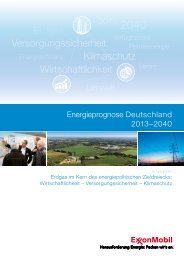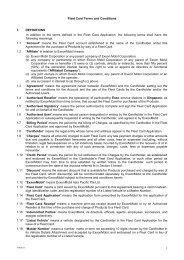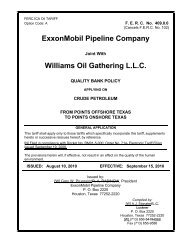2012 — Number 1 - ExxonMobil
2012 — Number 1 - ExxonMobil
2012 — Number 1 - ExxonMobil
You also want an ePaper? Increase the reach of your titles
YUMPU automatically turns print PDFs into web optimized ePapers that Google loves.
from unconventional sources will<br />
grow by more than 400 percent<br />
between now and then.<br />
Tillerson said this historic shift<br />
that is bringing abundant new<br />
supplies of natural gas carries<br />
environmental benefits. “Natural<br />
gas is cleaner-burning than other<br />
major energy sources, and this<br />
will help us meet our shared goals<br />
for reduced emissions and environmental<br />
stewardship,” he said.<br />
“In addition, the future of<br />
North American energy security<br />
continues to be transformed by<br />
advances in deepwater exploration<br />
and production,” he said.<br />
“In just over a generation – my<br />
generation – our industry has<br />
taken the concept of deepwater<br />
drilling from drawing board<br />
to execution, building some of<br />
the most complex engineering<br />
marvels in human history. In the<br />
process, we opened up a new<br />
frontier for energy production that<br />
has spread around the world. By<br />
2040, we expect North American<br />
and global deepwater production<br />
to double.”<br />
Emerging energy<br />
consensus<br />
Tillerson explained how this<br />
energy transformation is changing<br />
the policy landscape.<br />
“With our success has come<br />
a renewed public respect for<br />
the importance of high-impact<br />
technologies and the role our<br />
industry can play in powering<br />
the broader economy,” he said.<br />
“A new energy consensus is<br />
emerging. Policymakers from<br />
both sides of the political aisle,<br />
and from around the world, recognize<br />
that energy is essential<br />
to growth and progress, and<br />
that every technological advance<br />
in our field offers tremendous<br />
economic and environmental<br />
opportunities to achieve our<br />
shared aspirations of hope and<br />
opportunity for all.”<br />
Tillerson noted that energy<br />
policymaking is most effective<br />
in meeting national goals when<br />
the deliberation and dialogue are<br />
driven by open and frank discussions<br />
of the scientific, economic<br />
and practical realities that shape<br />
global energy markets. “For this<br />
reason, in the decades ahead,<br />
the successful development of<br />
conventional, unconventional and<br />
alternative supplies of energy<br />
will depend on more than just<br />
geologic conditions and technological<br />
innovations,” he said.<br />
“Success will depend on the<br />
private and public sectors fulfilling<br />
their respective responsibilities,<br />
and working together to build<br />
a climate of investment in and<br />
discovery of new technologies. In<br />
short, government and business<br />
must both do their part.”<br />
Roles of industry,<br />
government<br />
Tillerson said that industry’s role<br />
is to unlock and deliver new supplies<br />
of energy in a safe, secure<br />
and environmentally responsible<br />
way. “Our greatest strength is<br />
developing the technology and<br />
techniques that maximize value<br />
while increasing safety, efficiency<br />
and environmental performance,”<br />
he said.<br />
Government’s role is best<br />
fulfilled when it allows markets<br />
to operate freely and openly.<br />
“Sound energy policies do not<br />
pick winners and losers through<br />
subsidies or mandates or punitive<br />
tax policy,” he said.<br />
Mr. Tillerson concluded his<br />
remarks by noting that the<br />
energy industry is continuing<br />
to engage the public and<br />
policymakers to increase safety,<br />
improve performance and build<br />
regulatory capacity based on<br />
sound science as the industry<br />
deploys new and revolutionary<br />
technologies.<br />
“Industry and<br />
government<br />
have both<br />
played a role in this great energy<br />
transformation,” he said. “By<br />
recognizing our mutual contributions<br />
in this positive change, we<br />
can build on our achievements<br />
and provide a model for the<br />
world to increase investment,<br />
innovation, opportunity and<br />
progress for all.” the Lamp<br />
Following his address,<br />
Mr. Tillerson participated<br />
in an informal questionand-answer<br />
session with<br />
energy expert Daniel<br />
Yergin (right), chairman<br />
of IHS Cambridge Energy<br />
Research Associates.<br />
To learn more<br />
exxonmobil.com/<br />
cera<strong>2012</strong><br />
4

















